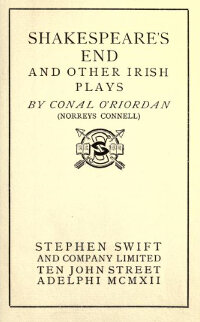Norreys Connell
In Shakespeare’s End and other Irish Plays
London: Stephen Swift and Company Limited, 1912
Hiding behind the name Norreys Connell, the Irish playwright Conal O’Riordan uses Shakespeare as a mouthpiece for his political views about the role of art in society, touching upon Anglo-Irish relations and the duty of playwrights to speak truth to power. He draws upon the story, told by John Ward, (1629–1681) that Shakespeare died after a night of drinking with Ben Jonson and Michael Drayton. O’Riordan introduces two visitors to this party, an English sailor and a Jesuit priest. The sailor causes Shakespeare to doubt the harsh imperialism of his beloved England, while the priest inspires an epiphany as Shakespeare questions the value of his art, and then seems to expire as a Catholic. Shakespeare’s wife also makes an appearance, as does his daughter Judith, who presents the prologue and promises a play in “barbarous blank verse and jingling rhyme.” —VH
